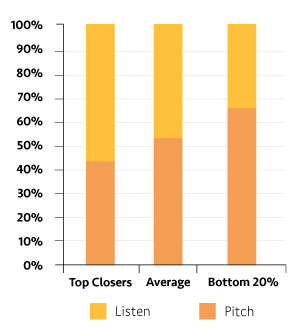The sales discovery process is a chance for sales reps to learn more about their prospect, the prospect’s organization, and business needs. Reps ask discovery questions to uncover useful information about buyer priorities and decision making procedures, in order to determine if they’re a qualified sales opportunity.
In this chapter, we’ll talk about making the most of those discovery conversations. How can you build trust and rapport with prospects while encouraging them to progress through your pipeline?
The discovery process isn’t just a question and answer exercise. Discovery should be conversational, an open and honest discussion about a prospect’s needs and purchase intent.
The Essential Guide to Sales Pipeline Management
Learn our strategic approach to tracking prospects throughout the pipeline, forecasting revenue, and closing more deals.
Buyers are liars, but sellers can never be.
Echoing a statement we made at the beginning of this guide, buyers often mislead sales reps. Your prospect may not disclose that they’re in contact with several other vendors, or they might lie about the extent of issues they’re facing without a solution in place.
If a sales rep wants to get past the protective layers of buyers who withhold information, they need to enter every sales conversation with honesty and empathy. Buyers pick up on exaggeration from salespeople, so be upfront when setting expectations and about what results your solution can provide.
One question we frequently hear from EBQ’s prospects when discussing our most popular service, lead generation, is “how many qualified sales meetings can I expect per month?” Our sales reps face questions like this head-on with honesty.
Because we have specialized knowledge about the industries we work with, we can provide a realistic estimation. Sometimes this number is lower than the prospect expects, in most cases, due to unrealistic expectations set by other firms.
We find that more often than not, buyers appreciate the candor of our reps, as well as their insight into the competitiveness and demand in their industries. We’ve had buyers who come back after being burned by other vendors’ overpromising, and down the line, those clients know they can trust our reps as advisors.
In one instance, a prospect of ours in the healthcare IT industry (now a long-time client) had been through several trials of working with outsourced sales support before ultimately choosing EBQ. They were disappointed by “pie-in-the-sky” promises from other companies, and we eventually won them over with our transparent, process-oriented sales process.
Sales has been stigmatized, and it’s unfortunate that salespeople are often associated with dishonesty. Performing prospect discovery in a way that shows you’re genuinely trying to help them find the best way to solve their challenges can be a strong differentiator for your brand.
How does discovery fit into a product demo?
Proper discovery will equip you with valuable info you can use during your product demonstration. The worst thing a rep could do on a discovery or demo call is “show up and throw up” — get on the call just to give a drawn-out pitch on all the features of the solution.
Your demonstrations should explain how the solution addresses each prospect’s specific challenges. Get this discovery insight beforehand or during the demonstration, so you can focus the limited time you have on the features and value propositions that your prospect will care about.
Otherwise, you might lose your prospect’s attention before you ever get to the features that would end up winning the prospect’s business. You should also learn about other key decision makers in the prospect’s company, so you can discuss product capabilities that would appeal to those stakeholders too.
Discovery meeting best practices
The discovery meeting is not just about convincing your prospect to buy. It’s an opportunity for you and your prospect to learn from each other. Your ultimate goal is to gain an understanding of the challenges they’re facing in their organizational environment, and to determine if your solution would be able to help.
Below are some best practices we recommend following for your sales discovery meetings.
1. Do your research & have a plan
Going into the discovery meeting, you should be familiar with the prospect’s role, their company, and their industry. You can use prospecting tools to perform research into these areas. Gaining insight into their job and industry, and pulling from past experience with similar prospects, helps you plan out questions in advance.
Showing buyers that you have some knowledge of their industry, and its common challenges, encourages them to trust you as an advisor and view you as genuinely helpful.
Templating your discovery process can also help these meetings go more smoothly. Try creating your own list of questions relevant to your buyers, and map out the different topics you’d like to cover in each discovery call. However, don’t focus only on what you want to talk about. The focus should be on what you need to learn from your prospect in order to tailor your pitch.
2. Always schedule the next meeting
Sales calls are rarely, if ever, one and done. If you’ve got a few more rounds of following up to do, always schedule the next meeting while still on the call. Don’t just send an email afterwards, get verbal confirmation of the next day and time you will speak to them.
Above all, it’s important that you never leave a sales conversation open-ended and unresolved. Always set some sort of expectation about following up, even if the prospect isn’t qualified. We mentioned placing unqualified prospects into the relationship cycle earlier, meaning follow up later down the line in case priorities have changed for their company or new challenges appear.
3. Listen more than you talk
The discovery meeting is meant to dig into those challenges that are significant enough to make a prospect buy. So let them do most of the talking. A study by Sales Hacker found the golden talk-to-listen ratio for sales calls is 43:57 — reps do 43% of the speaking and leave the other 57% of talk time to the buyer.

The same Sales Hacker study found that sales reps typically speak for 65-75% of the call, meaning most reps are talking too much. There are few ways to listen more and talk less.
One trick is leaving an awkward pause after they finish answering a question, so they feel compelled to elaborate more. Another strategy is articulating their challenge and emotions associated with it back to them, so they know you understand the challenge and speak more about its impacts.
The best way to address this talk-to-listen ratio is by asking open-ended questions, motivating prospects to elaborate beyond just a “yes” or “no.”
Open-ended questions for sales
Below are some of our best open-ended discovery questions that sales reps can use to qualify opportunities and learn more about prospect needs. We’ll adhere to the BANT qualification system to categorize these questions. But remember, you should always aim to learn more about your prospect, even after qualification.
Any information you can gather about your potential buyer can help you paint the picture of a better work environment and ultimately close the deal.
Budget
With these questions, you’re trying to determine if the prospect already has discretionary budget to spend on your solution or if they have the capacity to allocate the funds.
- How would you justify investment in this solution?
- What is your process for budgeting for a solution like this?
- How are solutions like this usually funded?
- If it remains unsolved, how will it affect business in the future?
Authority
These questions aim to identify the decision maker and gain some context around their internal decision-making process. It’s also helpful to speak to an evaluator and influencer, those who ultimately end up using the solution and who have some input in the process.
- If you were to make a purchase decision, who would help with that process?
- Can you walk me through a day in your job?
- What does the approval process look like?
- How would your leadership assess the success of this solution?
- What are the technical criteria influencing your decision?
Need
These questions are meant to narrow down the specific pain points that are driving your prospect to find a solution. This discovery helps you nurture the buyer by reminding them of how your solution could make their work life better.
- How have things changed in your business lately?
- What objectives do you have for [challenge]?
- What’s holding you back from reaching your goals?
- Where do you run into obstacles with your current solution?
- What would life be like without solving this? What is the consequence of doing nothing?
- How much would your day improve if you were able to solve this problem?
- What would solving this challenge mean for you personally?
Timeframe
Discovery questions about timeframe give you an idea of when the deal could eventually close, tell you how urgent the challenge is for the prospect’s organization, and help you determine if the prospect is qualified at this time.
- How soon do you want to implement a solution?
- What is your timeframe for this project?
- Are there any other contracts or solutions that would delay the process?
- How important is solving [challenge] for your business?
- What would you like to cover in this meeting?
Use these open-ended questions to keep the conversation going and develop rapport. Remember to listen! And speak to their individual challenges, instead of just responding with general statements about your solution.
Talk to your prospects with genuine curiosity and helpfulness, and they’ll be more likely to participate in an honest discussion about their needs.
The Essential Guide to Sales Pipeline Management
Learn our strategic approach to tracking prospects throughout the pipeline, forecasting revenue, and closing more deals.


